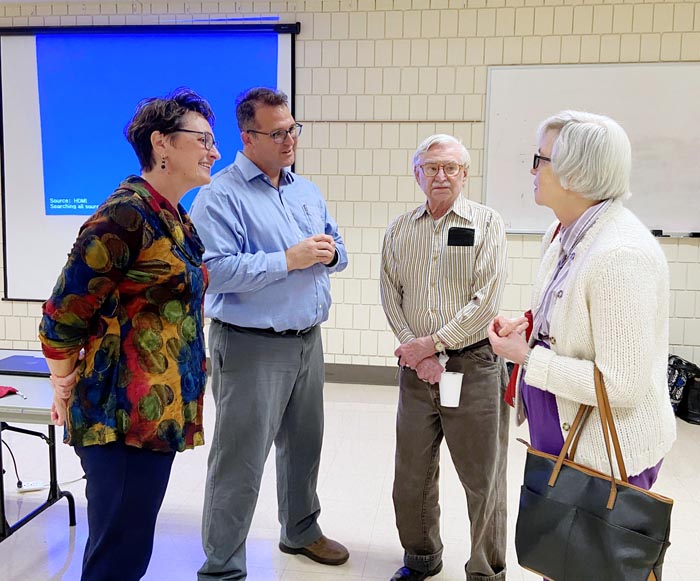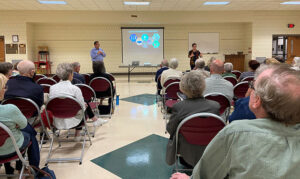
Amy and Ken Novak, left, talk with John and Linda Molyneaux of Davenport at St. John Vianney Parish in Bettendorf after the Novaks’ presentation on Catholic Social Teaching through the lens of relationships.
By Barb Arland-Fye
The Catholic Messenger
BETTENDORF — St. Ambrose University President Amy Novak and her husband Ken believe that building relationships with others is essential to living out Gospel values. That belief inspires them to invite students into their home for dinner with the family and to reach out to people they encounter in their daily lives, the couple shared during a Sept. 22 presentation at St. John Vianney Parish.
Their most recent guests included a group of swimmers with voracious appetites. The Novaks made a mental note to double up on the food they serve to the swimmers next time! Another guest was a student from another country whose many siblings share one but not both parents. Amy Novak has also spent time getting to know a student who lived in 13 foster homes growing up and was wary of others. The university president worked on building trust.
St. John Vianney Parish’s Social Justice Committee organized the presentation to provide an understanding of how the principles of Catholic Social Teaching help Catholics live out their faith and their role in the family, community, Church and world.
The Novaks believe Catholic Social Teaching provides the framework for building relationships. They enthusiastically walked their audience through their personal and professional experiences living out the Gospel values of Christ in the world. “When you open yourself up to the vulnerability of being in relationship with one another, you open yourself up to being the hands and feet of Christ in a powerful way,” Amy Novak said.
In her study of the university’s namesake, Amy Novak learned the fourth century saint embraced the grace of God by inviting to the table women, the poor, foreigners and other people usually excluded from dialogue. St. Ambrose used contemporary literature in relating to and leading people. “How can we learn from this doctor of the Church the ways we might approach one another in relationship? How do we find common ground?” Amy Novak asked. “Maybe it’s a movie, a Marvel hero or Lord of the Rings.”
Ken Novak, who teaches at St. Ambrose and is a bereavement counselor, spoke about transformational love as a core element of Catholic Social Teaching. “It’s the living tradition of the Church,” he said, in which one generation from the next takes up the torch to seek out the poor, respond to their needs and the needs of others. “Every time you love, every time you put the good of the other first, it’s transformational…. It comes from the very being who keeps the universe together. … God is love.

Ken Novak, front, left, and Amy Novak speak on Catholic Social Teaching through the lens of relationships at St. John Vianney Parish in Bettendorf last month.
Transformational love requires kenosis, an emptying of one’s self to be open to the will of Jesus, who exemplified love and demonstrated inclusion, not exclusion, Ken Novak said. Transforming love related to social action and justice requires preparation. “I have to take a little more of a leap of faith, to have a little more courage to build a bridge to get outside of my comfort zone.”
“We are all sinners. We all have fears. We all have needs.” Recognizing these three realities helps people find common ground and to avoid being judgmental, Ken Novak said. He identified eight ideas to foster transformational love:
1. Unplug from the rumor mill.
2. Don’t take the cynic’s bait.
3. Read/listen to “Barking to the Choir” or “Tattoos of the Heart” by Father Greg Boyle. Visit Mary Jo Copeland’s Sharing and Caring Hands website (sharingandcaringhands.org). Find an inspirational story. Share it with someone in conversation.
4. Do a completely random act of kindness.
5. Write down your fears. Read the Beatitudes. Discover where your fear fits in the Beatitudes. Begin to believe you are actually blessed.
6. With permission, touch a person you don’t think you would ever touch. “It is important to ask a person if it is OK if I shake their hand or give them a hug. We all have various wounds and sometimes touch can be more of a trigger than a comfort. You have to have developed a trust with that person, some degree of relationship.”
7. Take an inventory of how many things you do out of fear — religiously. Take an inventory of how many things you do out of love without feedback. How is your “religion?”
8. Bring your own grocery bag to the store. Bring an extra bag to share with someone — who likes the bag or thinks reusable bags are stupid.
“We’re always asking, from God’s lens, how do you minister with love to someone even if you don’t know who they are or where they’re coming from or their circumstances,” Amy Novak said. She shared how she had given a hug, with permission, to a student who was transgender. The student, ostracized by family and friends, told her, “That’s the first hug I have had in six months.”
Amy Novak believes that lay people owe it to the Catholic sisters, brothers and priests who started schools, hospitals and other ministries to carry on that commitment “to serving others and seeing Christ in everyone whom we encounter, whether they’re like us or not.”
“Amy and Ken emphasized the need to step out of our comfort zone to serve others, which leads to transformation. I really appreciated the emphasis of building a bridge of love to encounter others, especially those who are marginalized,” said Kari Miller of St. John Vianney’s Social Justice Committee.
“Too often in our culture today, whether it be politics or religion, we get caught up in what divides us, instead of what brings us together — our common ground. Rather than leaning into this division, as Amy said, it is best to err on the side of love — loving our neighbors. They did a great job providing tangible examples for handling the tough conversations and how to challenge ourselves to better love our brothers and sisters. I came away feeling empowered and challenged to do better each day to love all of those I encounter and to truly get to know them and meet them where they are.”
Through the personal examples they shared, the Novaks demonstrate they live what they believe, diocesan volunteer Glenn Leach said. “That is modeling and inspiring, over and above the wisdom of the words.”
Allison Ambrose, who leads St. John Vianney’s Social Justice Committee, said the committee’s members appreciated the Novaks’ approach toward dialogue between people who disagree about an issue. “In Catholic Social teaching, the question becomes, “How would Jesus respond?”
The principles of Catholic Social Teaching
“The Church’s social teaching is a rich treasure of wisdom about building a just society and living lives of holiness amidst the challenges of modern society,” the U.S. Conference of Catholic Bishops states. “Modern Catholic social teaching has been articulated through a tradition of papal, conciliar, and episcopal documents. The depth and richness of this tradition can be understood best through a direct reading of these documents.” The bishops highlight these key themes “at the heart of our Catholic social tradition:”
• Life and Dignity of the Human Person
• Call to Family, Community, and Participation
• Rights and Responsibilities
• Option for the Poor and Vulnerable
• The Dignity of Work and the Rights of Workers
• Solidarity
• Care for God’s Creation











